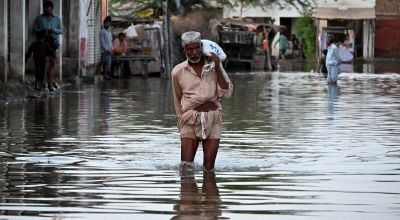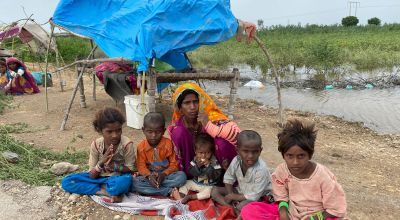
Read our 2024 annual report

Knowledge Hub
Community resilience building in Pakistan
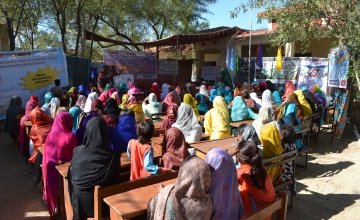
Climate-related disasters, such as floods, are a constant threat in many areas of Pakistan. Concern is working with affected communities, empowering them with the skills and tools they need to protect themselves from harm.
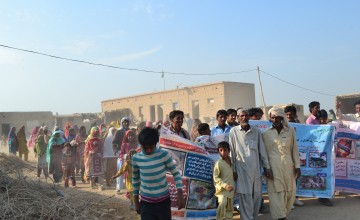
Nazeeran’s story
Until recently, Nazeeran Bibi felt that her life was held hostage by the floods. Pakistan, where she lives, is particularly vulnerable to flash floods, which have hit the country six times since 2010. Each one has caused massive damage, increasing pressure on already vulnerable communities by destroying homes and damaging crops. In 2015, nearly two million people were affected by floods. Nazeeran describes how her family were affected by the floods:
“We rushed to save our lives and had to eat leaves and drink the floodwater when it inundated our entire village. We were already poor and working hard to provide food for our children on a daily basis, but [the floods] left us even more deprived and impoverished.”
Community-Based Disaster Risk Management programme
But despair turned to confidence after Nazeeran became a community leader as part of Concern’s Community-Based Disaster Risk Management programme (CBDRM). The CBDRM programme has been helping Pakistan’s most vulnerable populations since 2011. Funded by the Office of U.S. Foreign Disaster Assistance, the programme aims to build community resilience to natural disasters.
“Now I have the knowledge and skills required to work toward managing disaster situations and my knowledge is power,” said Nazeeran.
Under the programme, Concern trains Emergency Response Teams (ERTs) that serve villages and regional Union Councils. Each team has about 50 members, comprising both men and women. The training focuses on first aid, search and rescue, firefighting, and distribution of relief supplies. Teams are also provided with the tools they need as first responders. After their training, ERT members return to their villages and teach other members of their community the techniques they have learned.
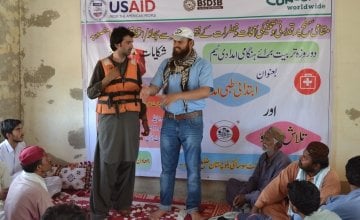
Flood proofing measures
Concern has also worked with communities to put in place small-scale flood-proofing measures and to improve water drainage, increasing resilience against floods. These measures are low cost, replicable, and effective — as demonstrated by the higher level of preparedness shown by CBDRM communities when floods hit between 2013 and 2015.
Empowering women
Women involved in the CBDRM programme have been empowered to make their voices heard in their villages and beyond – something that was once quite rare. CBDRM training also includes lessons on the construction and maintenance of the flood-proofing systems, ensuring that they are supported by communities and remain operational well into the future.
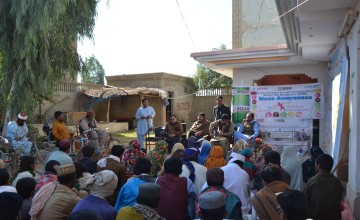
Disaster Risk Management in action
Nazeeran’s first responder skills were unexpectedly put to use on a hot day last July when straw and animal fodder caught fire, threatening homes in her village of Daman Shah in Pakistan’s Sindh Province. The men were out at work, but Nazeeran recalled the method she’d been taught to extinguish fires during her CBDRM training. She quickly gathered other women whom she had trained in disaster preparedness, and they worked together to douse the blaze, saving lives and property.
Promoting equality
The programme has contributed greatly to promoting equality by increasing opportunities for women. Because women are actively involved in the programme and have had the chance to become first responders — like Nazeeran — they have been able to work their way up to leadership positions. They have become a trusted source of knowledge about disaster preparedness.
Imamzadi, a primary school teacher in the Dadu district of the Sindh province, is one of the many women who were selected to represent their communities on their local Disaster Management Committees. Since then, Imamzadi has become an activist in her village, and has taken on the job of leading an advocacy campaign. She’s pushing her local government to not only take urgently needed steps to keep village drains clear to reduce the devastating impact of recurrent flooding, but also to make disaster preparedness a government priority.
Increased resilience
Now in its second phase, Concern’s programme covers seven districts in Pakistan. Nearly 1,500 trainers in 56 Union Councils have completed the programme. More than half of those trainers are women.
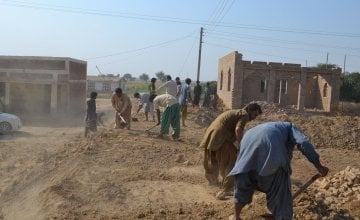
Evidence shows that the programme has increased community-level resilience. After recent floods, the damage in CBDRM programme areas wasn’t as severe as that suffered in other districts and provinces. It is hoped that community based disaster risk management will be rolled out in other districts and provinces in Pakistan, and that they too will see the benefits.
Follow us on Instagram
Follow our journey as we work to end extreme poverty, whatever it it takes.




